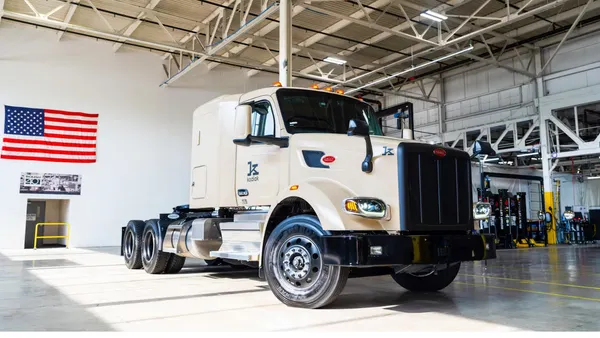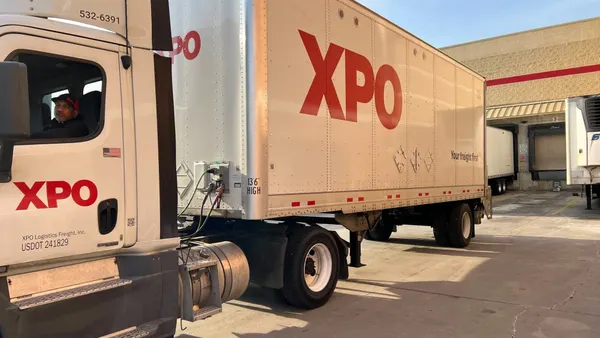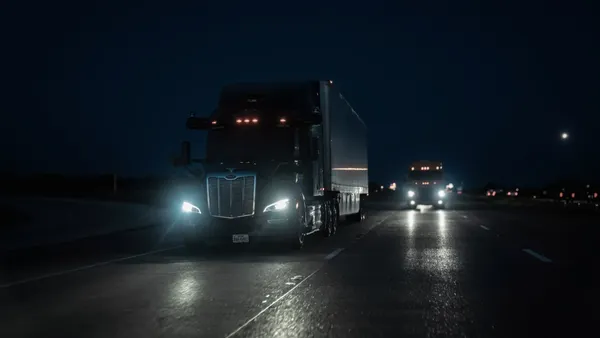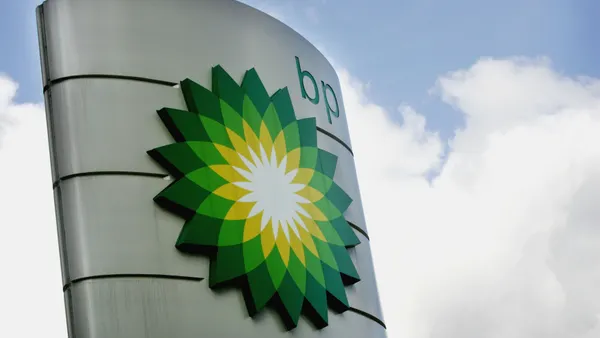Dive Brief:
- Anheuser-Busch will convert 180 trucks — 30% of its fleet — to renewable natural gas, known as RNG, the company announced Wednesday. The effort is part of the brewer's sustainability goals, set for 2025.
- The trucks travel 8.5 million miles each year and the change will reduce its emissions by more than 70% compared to diesel, the brewing company said. That is equivalent to taking 66,000 cars off the road.
- Anheuser-Busch will contract with Agility Fuel Solutions, which converts medium- and heavy-duty vehicles. The trucks will use RNG, or biomethane, which is interchangeable with compressed natural gas, known as CNG. RNG can take the form of either CNG or liquefied natural gas (LNG) for transportation fuel, according to the Department of Energy.
Dive Insight:
The competition for green technology in trucking is getting crowded. Now Anheuser-Busch, which has already committed to using CNG in some trucks, will also use RNG.
In 2014 and 2015, Anheuser-Busch converted 160 diesel trucks in Houston and St. Louis to engines powered by CNG. The company has also looked at battery-electric vehicles and fuel-cell electric vehicles.
By converting to RNG, Anheuser-Busch joins large for-hire fleets, such as UPS, which began converting trucks to RNG in 2013. The company made one of the largest U.S. purchases of RNG in 2019.
The reasons UPS went with RNG to power its fleet involved the fuel becoming more widely available, its ability to seamlessly integrate into an existing natural gas system and its "very good emissions profile," Mike Casteel, then UPS director of fleet procurement, said in an interview with Supply Chain Dive in May 2019.
In 2019, UPS had more than 50 natural gas stations and several thousand natural gas trucks operating in the United States, Casteel said. Since 2009, UPS has invested $1 billion in "alternative fuel and advanced technology vehicles and fueling stations globally," according to a press release.
The RNG-fueled trucks will get their fuel from U.S. Gain and American Natural Gas, Anheuser-Busch said. The methane used to create RNG is produced by farmers, landfill owners and municipalities, according to U.S. Gain. RNG is ranked as renewable fuel by the Department of Energy because it is made using the gaseous byproduct of decaying organic material.
Other power options are on the table at Anheuser-Busch. In November, Nikola and electric-vehicle company BYD Motors helped Anheuser-Busch complete its first-ever zero-emission beer delivery, in the beer company’s hometown of St. Louis, according to a news release. Nikola used a hydrogen-electric truck on its delivery leg.
Anheuser-Busch announced in April 2018 its 2025 sustainability goal, a plan to reduce carbon emissions by 25%. Other fleets have announced similar goals, but how to proceed is still up for debate in trucking.
Battery-electric trucks are considered the way of the future by the CEO of the largest truck maker. In April 2019, Daimler Trucks North America CEO Roger Nielsen told attendees of the ACT Expo that his company considered battery-powered trucks the future path for the industry.
The North American Council for Freight Efficiency said more fleets should put electric trucks into regional use, in a Feb. 23 news release. Mike Roeth, NACFE executive director, said 800,000 of the 1.7 million over-the-road tractors are day cabs, which are regional haulers.
But companies such as Nikola are betting on fuel-cell vehicles, too, and point to the ability of such trucks to haul over greater distances.










